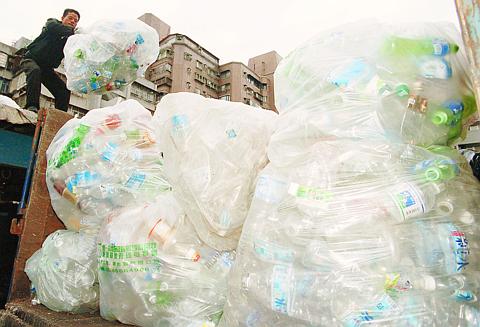Legislators said yesterday that massive losses incurred by a plastic bottle recycling program should be blamed on the management of the project, and not on the system of rewards offered to consumers as an incentive to recycle.
The PET bottle (
At a press conference yesterday, DPP legislator Lai Chin-lin (賴勁麟) provided some recent statistics that showed the number of PET bottles collected nationwide from the beginning of 1998 until the end of 1999 far outstripped the number manufactured.

PHOTO: CHIANG YING-YING, TAIPEI TIMES
The total figure was 146 percent of the number of bottles reportedly manufactured -- a figure that suggests bottle production is going unreported.
"This highlights the need for an urgent change to existing recycling policy," Lai said, referring to claims that the Environmental Protection Administration (EPA) had failed to properly examine the PET bottle market.
Lai said that manufacturers have understated their production to avoid paying a required sum of money proportional to their total bottle production, to offset money paid out to consumers by the EPA for bottles they recycle.
"In addition to understating their production, plastic container manufacturers sometimes sell imperfect products directly to retailers that recycle used containers," Lai said.
According to statistics from the EPA in 1997, about 1.22 percent of flawed PET bottles -- which never made it to the market -- have been recycled as if they were actually used. However, it is believed that the real situation could be far worse than statistics show.
Lai also said that the EPA rewarded consumers with NT$1 for each bottle recycled, while only charging manufacturers NT$0.7 per bottle produced.
In a bid to slow the rate of financial loss, the EPA decided early this month to downwardly adjust the existing per-bottle refund from NT$1 to NT$0.5 for consumers who recycle PET bottles, to be effective from March.
In addition, the EPA announced that refunds would be canceled altogether in September to avoid further financial losses.
However, legislators said that the cancelation of the refund was not the ultimate solution to existing financial losses. Fixing the flawed recycling policy should be the first priority for the EPA's Recyclable Resources Foundation (
Foundation officials, responding to the legislators' accusations, said inspection of PET bottle production would be carried out more strictly, and debts owed by manufacturers would be pursued.
Officials said that the cancelation of the refund was intended to eliminate the loss-making situation, adding that the NT$1 per bottle was available only for PVC containers, including PET bottles, one of 29 types of recyclable containers listed by the EPA.
"The reward strategy was to encourage people to recycle reusable materials, such as PET bottles, because recycling was un almost unheard of phenomenon at the time," said Shen Chih-shiou (

CHAOS: Iranians took to the streets playing celebratory music after reports of Khamenei’s death on Saturday, while mourners also gathered in Tehran yesterday Iranian Supreme Leader Ayatollah Ali Khamenei was killed in a major attack on Iran launched by Israel and the US, throwing the future of the Islamic republic into doubt and raising the risk of regional instability. Iranian state television and the state-run IRNA news agency announced the 86-year-old’s death early yesterday. US President Donald Trump said it gave Iranians their “greatest chance” to “take back” their country. The announcements came after a joint US and Israeli aerial bombardment that targeted Iranian military and governmental sites. Trump said the “heavy and pinpoint bombing” would continue through the week or as long

TRUST: The KMT said it respected the US’ timing and considerations, and hoped it would continue to honor its commitments to helping Taiwan bolster its defenses and deterrence US President Donald Trump is delaying a multibillion-dollar arms sale to Taiwan to ensure his visit to Beijing is successful, a New York Times report said. The weapons sales package has stalled in the US Department of State, the report said, citing US officials it did not identify. The White House has told agencies not to push forward ahead of Trump’s meeting with Chinese President Xi Jinping (習近平), it said. The two last month held a phone call to discuss trade and geopolitical flashpoints ahead of the summit. Xi raised the Taiwan issue and urged the US to handle arms sales to

State-run CPC Corp, Taiwan (CPC, 台灣中油) yesterday said that it had confirmed on Saturday night with its liquefied natural gas (LNG) and crude oil suppliers that shipments are proceeding as scheduled and that domestic supplies remain unaffected. The CPC yesterday announced the gasoline and diesel prices will rise by NT$0.2 and NT$0.4 per liter, respectively, starting Monday, citing Middle East tensions and blizzards in the eastern United States. CPC also iterated it has been reducing the proportion of crude oil imports from the Middle East and diversifying its supply sources in the past few years in response to geopolitical risks, expanding

Pro-democracy media tycoon Jimmy Lai’s (黎智英) fraud conviction and prison sentence were yesterday overturned by a Hong Kong court, in a surprise legal decision that comes soon after Lai was jailed for 20 years on a separate national security charge. Judges Jeremy Poon (潘兆初), Anthea Pang (彭寶琴) and Derek Pang (彭偉昌) said in the judgement that they allowed the appeal from Lai, and another defendant in the case, to proceed, as a lower court judge had “erred.” “The Court of Appeal gave them leave to appeal against their conviction, allowed their appeals, quashed the convictions and set aside the sentences,” the judges